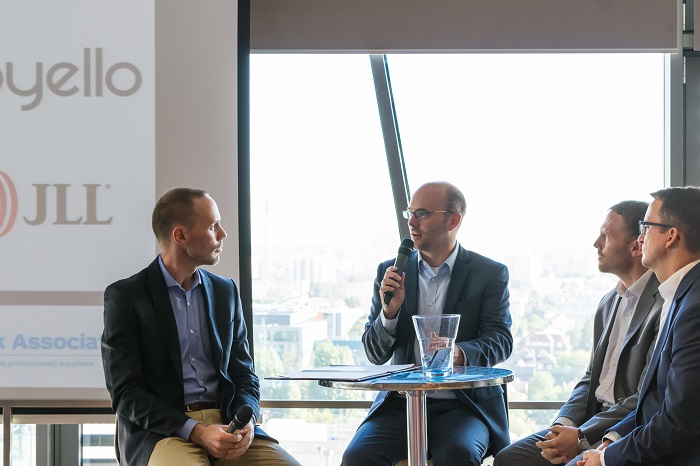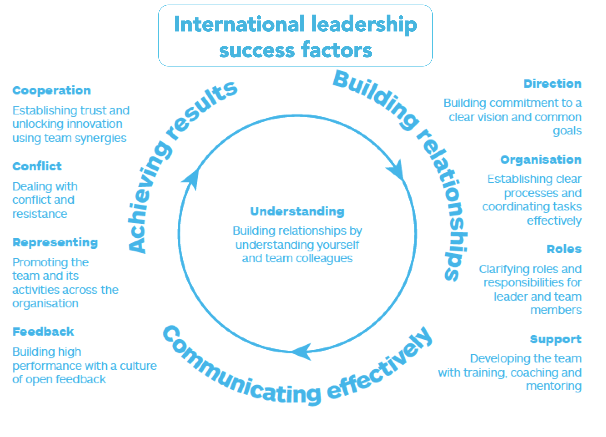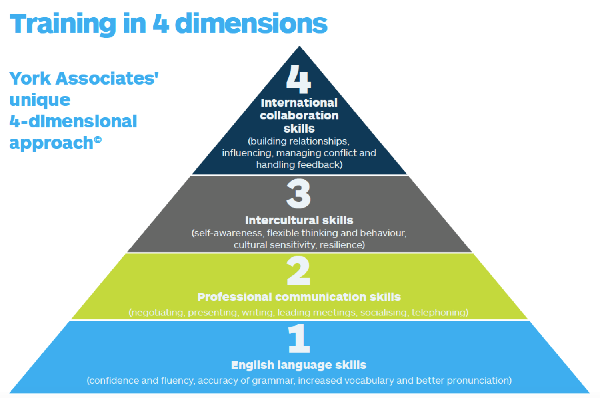The global labour market on which Tri-City firms operate: corporations, start-ups and the entire SME sector (small and medium enterprises), is subject to continuous development. This fact contributes to various changes of organization in the firms and also causes changes in the management style and creates new needs for changes in the communication among people in international and virtual teams.
Two main challenges for individuals responsible for the execution of processes in companies are: cultural differences and the quality of language skills of employees and the managerial staff. This situation becomes an impulse for the making of new decisions to improve the quality and effectiveness in main management areas.
An inaugural meeting in the “Let`s talk Business” cycle aimed at an initiation of a dialogue about the role and importance of an effective communication for business development was held in the Olivia Sky Club on September 21. We are talking to the initiator of the series of meetings under the same title: Paweł Banaszak, the Communication Manager in “LEC Centre Spółka z o.o.” and Mike Hogan, the York Associates Director.

Monika Bogdanowicz (Olivia Business Centre): How was the idea of a series of events related to effective communication in a dynamically changing work and business environment born and what are the goals you set as a part of that project?
Paweł Banaszak, Communication Manager, LEC Centre Spółka z o.o., the initiator of “Let`s talk business” meetings taking place in the Olivia Sky Club.
“We have been supporting our customers learning foreign languages for 20 years. We mainly do that by sending them to language courses abroad. Many of our customers want to speak a foreign language fluently at work. And they are getting better in it. However, fluent daily language skills are not sufficient to effectively communicate in the world of international business. The ability to combine the language with typical business skills: making presentations, negotiating or hosting teleconferences are getting important. The awareness of cultural differences and their influence on the executed project, teamwork or the business as a whole is equally important.
We have good relations with educational institutions worldwide. Thanks to them, we can not only send customers to courses abroad but also invite experienced experts to share their knowledge in Gdańsk. We want to give knowledge to people who use languages in business; this is why we called the series “Let’s Talk Business”. We will invite foreign experts who will provide practical knowledge. Everyone with international business relations will be able to apply such knowledge at once.
MB: What is your opinion about challenges in the relationship building area that managers responsible for the realization of global business processes are facing? What is the greatest barrier/issue for the managers?
One of the challenges that managers face worldwide, not only in Poland, is being aware that success in international relations does not result from language skills and managerial skills only; it also requires the awareness of cultural differences. And I am not only talking about “trivia”: how you offer your visiting card in Asia or that the Americans are very direct when providing feedback. It is about the importance of what cultural baggage of team members influences the team’s dynamics and effectiveness. The more intercultural interactions take place in a team or firm, the more significant the role of that component becomes. Not only people working for large corporations need that awareness and related knowledge. For example, start-up founders who talk to investors should also know the difference between the building of relations with Asians and the cooperation with Europeans. It is easier to establish trust on the basis of such knowledge.
MB: How can we help ourselves understand one another better in spite of cultural differences that frequently determine whether a team or a firm can be successful or is doomed to fail?
I think that there are two pillars of success in this area. The first, basic one is the awareness of cultural differences and their influence on the business. It makes the operation in the world of business easier. The basics of that awareness are gained throughout the business practice. Training courses executed by experienced trainers are an effective way to make full use of the potential offered by the conscious management of an international team. Opportunities offered by the cooperation with foreign schools are worth taking advantage of because there is still too little of such knowledge in Poland. Trust is the second pillar. A manager aware of cultural differences, with related competences and able to listen to people he works with will be able to use these differences effectively to build trust within the team. And, according to managers who took part in our panel during the “Let’s Talk Business”, it is the basis of an effective communication and growth.
Monika Bogdanowicz (Olivia Business Centre): Communication and cooperation in international teams face many obstacles and pressures every day when we interact with people we don’t know, don’t meet face to face and often don’t understand the way they act. How do you help managers and their team members to carry out their work well and to grow their businesses?
Mike Hogan, Director, York Associates: Our mission is to support professionals working internationally to collaborate more effectively to deliver better results. It relies on the philosophy of the learning cycle that consists of reflection, action and feedback to help managers and team members drive high performance through continuous learning.
York Associates’ international leadership and teambuilding training is based on two approaches:
- The understanding of the 4 core challenges related to the internationalization of teams: uncertainty, complexity, paradox and diversity
2. The building of a strategy to manage 9 critical success factors for international leaders and teams:

MB: The complexity of processes that take place in international companies requires the development of relationships and trust that you refer to as pillars of professionalism in action. What do you consider the best ways to develop these competencies in individuals and teams?
If you ask business people about that essential component that enables international teams and organisations to perform excellently you will often get a one-word answer: ‘trust’. Building trust takes time and, to build it, leaders have to be seen as competent, reliable, involved and empathetic, having integrity and demonstrating mutual trust. My colleague Bob Dignen described these points well in his book, Effective International Business Communication (Collins)
MB: You manage York Associates that developed the unique formula of 4 pillars of language and communication skill training. Please highlight the main concepts of this method.
We believe that the objective of our language training is to help clients communicate effectively in English. However, in order to be truly effective, we need to go beyond learning vocabulary, grammar and professional skills such as English for meetings, presentations and so on. In addition to these skills, we look at the international context in which our clients communicate and help them develop the cultural sensitivity and international collaboration skills necessary in the international business. To help us visualize what we mean, we developed our unique 4-dimensional approach as can be seen below:

MB: During your presentation at the meeting with managers of the Olivia Business Centre, you presented a very interesting description of the „push” and „pull” strategies and styles of communication used to attain business goals. Which of these two strategies is preferred in international teams and what makes it more efficient?
It is impossible to say which of these two styles is best in international contexts. However, we need to be aware of our natural style and reflect continuously on whether that style can bring us success and help us achieve desired results or hinder us. So, rather than using a specific style, we should be sensitive to the needs and styles of others, be flexible and adaptable so we can choose a style that fits the situation best.




